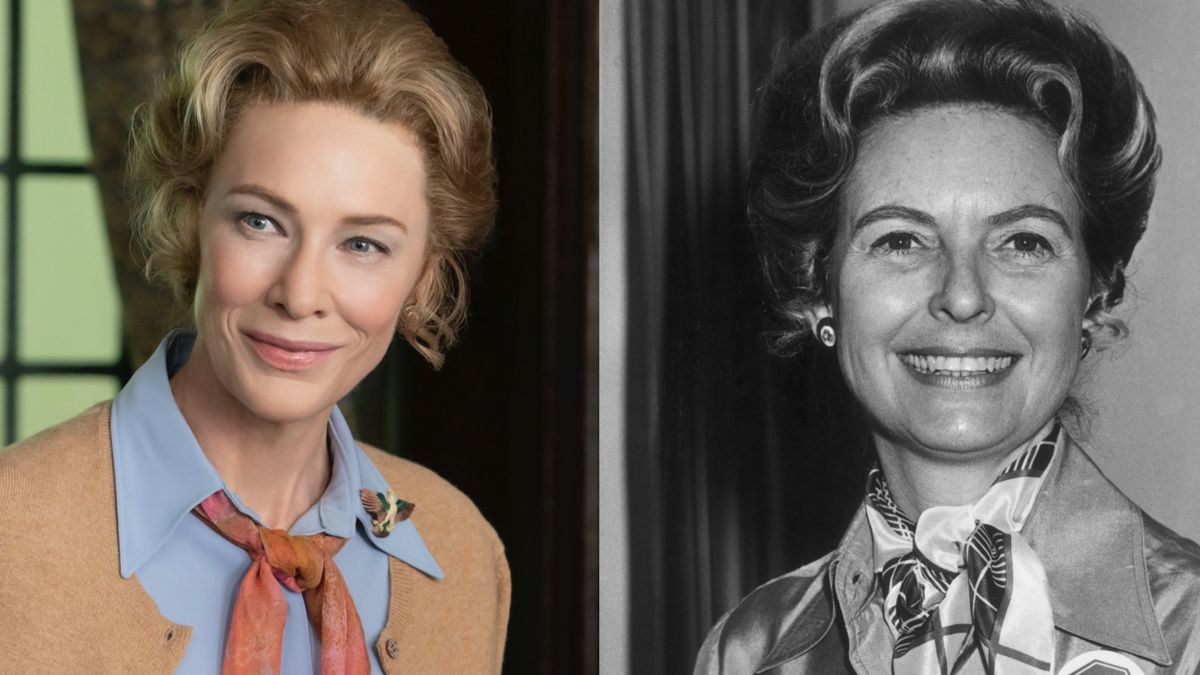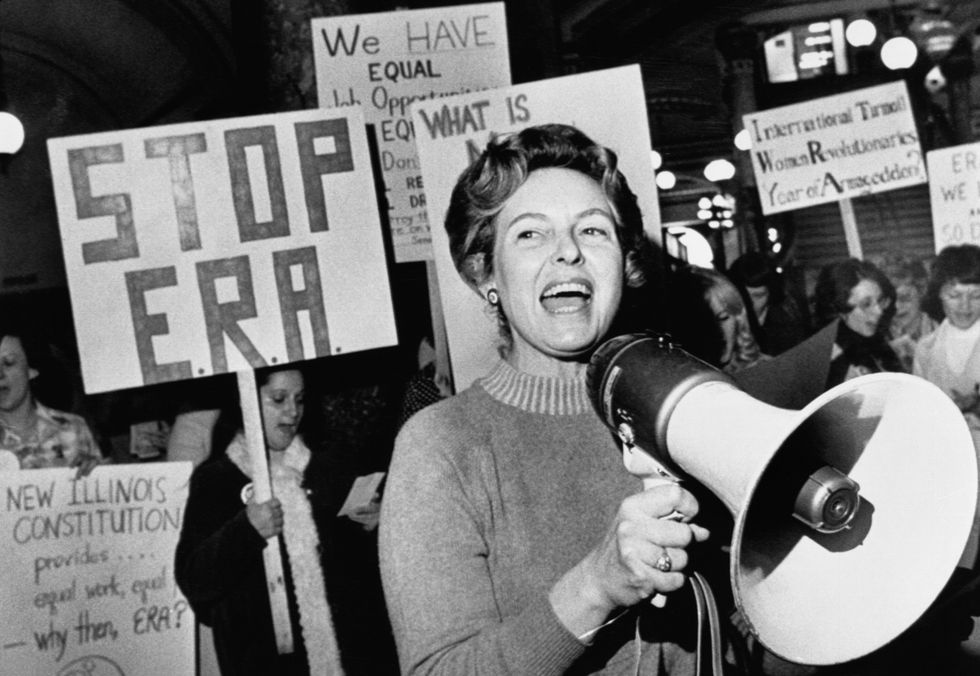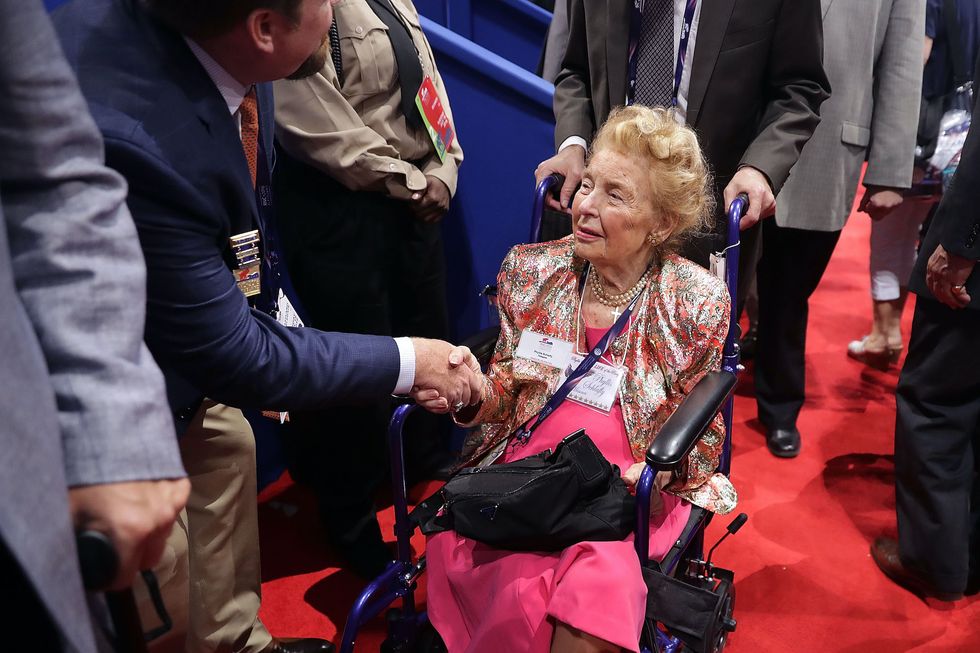“Phyllis Schlafly. If you’ve never heard of her, congratulations,” John Oliver joked in a recent segment about the Equal Rights Amendment. If you're one of these people who hasn't heard of the infamous conservative activist, now’s the time to get up to speed, as her life and times have become the focus of FX’s sensational new series, Mrs. America. Widely viewed as a villain and as a traitor to women, Schlafly nonetheless held enormous sway over conservative women across America, making it her life’s work to advance conservative ideologies on gender roles, international relations, and same-sex marriage.
Born in 1924 to a Roman Catholic family, Schlafly enjoyed a middle-class childhood in St. Louis until her father lost his job during the Great Depression, causing her mother to enter the workforce as a librarian and schoolteacher in order to support the family. To put herself through a bachelor’s degree in political science at Washington University, St. Louis, Schlafly worked the night shift in a munitions factory; she then went on to earn a master's degree in government from Radcliffe College, now a part of Harvard University. Following a brief stint at a conservative think-tank in Washington D.C., Schlafly returned to St. Louis, where in 1949, she married a wealthy lawyer, John Fred Schlafly, Jr., and settled down to raise six children.
Schlafly’s political efforts began in 1952, when she mounted a campaign for the House of Representatives on a strong anti-communist platform. She unexpectedly triumphed in the Republican primary, but lost the election to her Democratic challenger. Schlafly subsequently began attending the annual Republican National Convention, where in 1960, she helped to lead a revolt of “moral conservatives” who opposed Richard Nixon’s stance “against segregation and discrimination.” In 1964, she rose to national prominence with the publication of A Choice Not An Echo, a self-published book that accused Republican elites of excluding grassroots conservatives from presidential nominating conventions. The book sold over three million copies and buttressed the presidential campaign of Barry Goldwater, who ultimately lost in a landslide to incumbent Lyndon B. Johnson.
In 1967, after losing her bid to become the president of the National Federation of Republican Women, Schlafly began publishing The Phyllis Schlafly Report, a monthly newsletter intended to mobilize her supporters, which consisted mostly of conservative homemakers. In a 1972 edition of the newsletter, she announced her opposition to the Equal Rights Amendment, a proposed constitutional amendment outlawing gender discrimination, which had sailed through Congress that same year. It’s in this opposition that Mrs. America finds its source material, charting Schlafly’s years-long battle with second wave feminists to defeat the ratification of the amendment.
Schlafly focused her opposition to the ERA in defense of traditional gender roles, arguing that the amendment would conscript women into military service, lead to unisex restrooms, and remove “dependent wife” benefits under Social Security. All of these arguments were specious, as the ERA, a historically brief amendment, sought only to guarantee equality under the law regardless of gender. Schlafly not only mischaracterized the amendment, but dismissed sex discrimination as a concept, saying, "I knew of only one law that was discriminatory toward women, a law in North Dakota stipulating that a wife had to have her husband's permission to make wine." Such an argument was characteristic for Schlafly, who antagonized her opponents with statements like "sexual harassment on the job is not a problem for virtuous women" and "sex education classes are like in-home sales parties for abortions."
Schlafly founded the lobbying organization Stop ERA, which was later subsumed into Eagle Forum, a larger special interest group Schlafly founded for conservative, anti-feminist ideologies. With local chapters across the country, Stop ERA lobbied state legislatures not to ratify the amendment, trading on symbolism surrounding the traditional American housewife by delivering homemade foods to lawmakers. Schlafly and thousands of her supporters arrived at statehouses bearing breads, jams, and apple pies, with the slogan, “Preserve us from a congressional jam; vote against the ERA sham.” Ultimately, the ERA was narrowly defeated, falling just three states shy of the number needed for ratification. Schlafly and her well-organized followers were widely credited with dealing the death blow, while the defeat of the ERA is viewed as a leading factor in dismantling the considerable momentum of the second wave feminist movement.
In 1977, American feminists gathered at the historic National Women’s Conference in Houston, where they hoped to unify the feminist movement and vie for national attention. Schlafly organized a counter-protest called the Pro-Life, Pro-Family Rally, where protestors announced the beginning of a pro-family movement centered on “family values” in American politics. As a result, the Republican party moved further to the right, leading to the eventual election of conservative Ronald Reagan.
In the decades following the defeat of the ERA, Schlafly remained an influential voice in conservative circles, continuing to serve as a delegate at Republican national conventions and making appearances on radio shows and television programs. She penned a nationally syndicated newspaper column for Creators Syndicate and wrote prolifically, publishing 26 books on subjects ranging from childcare to the so-called evils of feminism. Conservative presidential candidates coveted her endorsement, with only a select few (John McCain, Michele Bachman, Rick Santorum, and Donald Trump) managing to earn it.
As Mrs. America notes, Schlafly’s career as a writer, speaker, and activist seemed at odds with her stated beliefs about the traditional family and the role of women as homemakers. Later in her life, when her son John Schlafly was outed as gay by Queer Week in 1992, she came under fire for hypocrisy, as she declined to disavow her son while remaining a vocal opponent of same-sex marriage. Schlafly remains widely reviled, though religious conservatives view her as a definitive force in defending "pro-family" values.
In September 2016, Schlafly died of cancer at the age of 92. The day after her death, her final book was published: The Conservative Case for Trump. Mrs. America takes pains to draw parallels between Trump and Schlafly, both of whom share an affinity for “alternative facts” when reporting crowd sizes and describing the outcomes of proposed legislation. Like Trump, Schlafly stoked conservative resentment through anti-establishment politics, arguing that the party was increasingly puppeted by “secret kingmakers.”
“Phyllis Schlafly might be dead, but her America is alive and well,” Emma Green wrote in The Atlantic circa 2016. “Trump is proof that Schlafly’s political style and conservative values still resonate with a large portion of the American electorate.”














